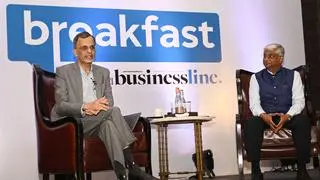Facing the threat of sanctions by the US for what it terms India’s lax intellectual property (IP) rules, the Commerce Ministry is studying the possible impact on trade with the US if Washington goes ahead with its action.
The Office of the US Trade Representative is to come out with its annual Special 301 report by the month-end on the adequacy and effectiveness of IP rights protection by its trading partners.
If the report classifies India as a ‘priority foreign country’ — as demanded by the US pharmaceutical lobby — Washington could impose economic sanctions against India that will include withdrawal of duty-free benefits or imposition of penal duties.
The USTR’s earlier reports have put India under the ‘priority watch list’, as a country that needs to tighten its IP regime.
A Commerce Ministry official told Business Line “that “since the US is one of our largest export destinations, it is important to understand how much our trade could get hit if sanctions are imposed. We may have to take steps to support sections of our industry that get affected”.
Cabinet Secretary Ajit Seth has called a meeting of senior officials of the Ministries and Departments concerned, including Commerce, Industry and Pharmaceuticals, to discuss the imminent threat of sanctions.
‘Unjustified’New Delhi believes that the threat is unjustified as the category of ‘priority foreign country’ is reserved for very serious intellectual property law offenders, while India’s legislation is in line with global specifications.
Ukraine is the only country on the list at the moment.
“We will examine in detail the options available under the dispute settlement undertaking of the WTO, in case it (India) does get categorised as a ‘priority foreign country’,” the official said. Retaliatory action, too, could be considered, he added.
US drug majors upsetAlthough India amended its patent laws in 2005 to bring them in line with the Trade Related Intellectual Property Rights of the World Trade Organisation, US drug majors are upset with Section 3 (d) of the country’s patent law, which refuses to grant patents for incremental innovations.
With pharmaceutical companies expected to take a hit of over $40 billion in 2014 revenues and $50 billion the next year as their patents run out, the US is under pressure to force India to drop the provision.
Pharmaceutical companies are also unhappy with New Delhi’s decision of 2012 to grant a compulsory licence to an Indian company for the manufacture of a copied version of Bayer’s cancer medicine, Nexavar.
This move brought down the price of the drug by 90 per cent.
Harmful to both sidesThe US India Business Council, the trade body representing businesses of both countries, has warned that economic sanctions imposed by the US on India could harm American companies as much as Indian businesses.
In 2012-13, the US was India’s third largest trading partner, accounting for exports worth $36 billion and imports of $25 billion.







Comments
Comments have to be in English, and in full sentences. They cannot be abusive or personal. Please abide by our community guidelines for posting your comments.
We have migrated to a new commenting platform. If you are already a registered user of TheHindu Businessline and logged in, you may continue to engage with our articles. If you do not have an account please register and login to post comments. Users can access their older comments by logging into their accounts on Vuukle.